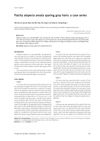 6 citations,
June 2011 in “British Journal of Dermatology”
6 citations,
June 2011 in “British Journal of Dermatology” People with alopecia areata have higher levels of RBP4 protein and antibodies against it.
 2 citations,
February 2014 in “Hair therapy & transplantation”
2 citations,
February 2014 in “Hair therapy & transplantation” Alopecia Areata is an autoimmune condition causing hair loss, influenced by genetics, environment, and possibly improved by anti-MIF therapy, with many patients experiencing regrowth within a year.
1 citations,
January 2020 in “Indian journal of dermatology, venereology, and leprology” CD117 and platelet-derived growth factor receptor α may play a role in alopecia areata.
 1 citations,
January 2017 in “Springer eBooks”
1 citations,
January 2017 in “Springer eBooks” Understanding the immune-related causes of Alopecia Areata has led to potential treatments like JAK inhibitors.
1 citations,
August 2005 in “Springer eBooks” Alopecia areata is an autoimmune disease with genetic links, treatable with certain medications, and can affect mental health.
 November 2022 in “Journal of Education, Health and Sport”
November 2022 in “Journal of Education, Health and Sport” The skin's bacteria might influence the development of a hair loss condition called alopecia areata.
 October 2022 in “Benha Journal of Applied Sciences”
October 2022 in “Benha Journal of Applied Sciences” Human Beta Defensin 1 levels do not predict the risk or severity of Alopecia Areata.
 January 2011 in “International Journal of Trichology”
January 2011 in “International Journal of Trichology” The document concludes that doctors should recognize congenital triangular alopecia to avoid unnecessary treatments, as it does not respond to steroids like alopecia areata does.
 April 2012 in “Encyclopedia of Life Sciences”
April 2012 in “Encyclopedia of Life Sciences” Different genes are linked to various types of hair loss.
December 2021 in “Journal of V. N. Karazin Kharkiv National University: Series Medicine” The treatment improved hair health in women with androgenetic alopecia.
35 citations,
July 2008 in “Dermatologic therapy” Cicatricial alopecia may be caused by immune attacks on hair follicles, gland issues, or stem cell damage.
 50 citations,
March 2000 in “American Journal of Clinical Dermatology”
50 citations,
March 2000 in “American Journal of Clinical Dermatology” Alopecia Areata has no guaranteed treatment for hair regrowth, but options like corticosteroids and minoxidil are used, with future research focusing on genetic and immune therapies.
 61 citations,
September 2010 in “Genomics”
61 citations,
September 2010 in “Genomics” The study found that immune responses disrupt hair growth cycles, causing hair loss in alopecia areata.
 24 citations,
October 2012 in “Journal of Ginseng Research”
24 citations,
October 2012 in “Journal of Ginseng Research” Korean Red Ginseng may help improve hair regrowth when used with corticosteroid injections for Alopecia Areata.
 23 citations,
March 2001 in “Clinics in dermatology”
23 citations,
March 2001 in “Clinics in dermatology” Alopecia areata involves immune response and gene changes affecting hair loss.
 4 citations,
April 2020 in “JAAD case reports”
4 citations,
April 2020 in “JAAD case reports” JAK inhibitors help hair regrowth but not fully effective for androgenetic alopecia.
 January 2016 in “Journal of The Korean Medical Association”
January 2016 in “Journal of The Korean Medical Association” The document says how to diagnose and treat hair loss from alopecia areata, but there's no cure and treatments vary.
 59 citations,
September 2008 in “Experimental dermatology”
59 citations,
September 2008 in “Experimental dermatology” Both mouse and rat models are effective for testing alopecia areata treatments.
 43 citations,
March 2011 in “Journal of psychosomatic research”
43 citations,
March 2011 in “Journal of psychosomatic research” Kids with alopecia areata may experience more stress but not necessarily feel more anxious or depressed than others.
 37 citations,
November 2003 in “Veterinary pathology”
37 citations,
November 2003 in “Veterinary pathology” Hair loss in mice starts with immune cells damaging hair roots before it becomes visible.
 36 citations,
May 2011 in “Dermatologic therapy”
36 citations,
May 2011 in “Dermatologic therapy” No treatments fully cure or prevent alopecia areata; some help but have side effects or need more research.
 33 citations,
July 1992 in “Journal of Investigative Dermatology”
33 citations,
July 1992 in “Journal of Investigative Dermatology” Minoxidil doesn't affect perifollicular lymphoid infiltration in alopecia areata patients.
 22 citations,
June 2013 in “Australasian Journal of Dermatology”
22 citations,
June 2013 in “Australasian Journal of Dermatology” Early stage bald spots are linked to skin inflammation and damage to the upper part of the hair follicle.
 19 citations,
January 2018 in “Scientific Reports”
19 citations,
January 2018 in “Scientific Reports” Non-immune factors play a significant role in alopecia areata.
 13 citations,
January 2014 in “Postępy Dermatologii i Alergologii”
13 citations,
January 2014 in “Postępy Dermatologii i Alergologii” Patchy alopecia areata can affect only pigmented hairs, leaving gray hairs untouched.
 2 citations,
January 2023 in “Prague Medical Report”
2 citations,
January 2023 in “Prague Medical Report” JAK inhibitors, like baricitinib, are effective and safe for treating alopecia areata.
 1 citations,
January 2020 in “Benha Journal of Applied Sciences”
1 citations,
January 2020 in “Benha Journal of Applied Sciences” Certain gene variations may increase the risk and severity of alopecia areata.
 1 citations,
May 2017 in “InTech eBooks”
1 citations,
May 2017 in “InTech eBooks” The document concludes that alopecia areata is an unpredictable autoimmune hair loss condition with no cure, but various treatments exist that require personalized approaches.
 1 citations,
January 2015 in “Springer eBooks”
1 citations,
January 2015 in “Springer eBooks” The document says a skin condition called alopecia areata causes hair loss and stress, and is treated with strong skin creams, injections, or other therapies, but treatment success varies.
 January 2018 in “Elsevier eBooks”
January 2018 in “Elsevier eBooks” The document concludes that alopecia has various forms, each with specific treatments, but no definitive cure for certain types like CCCA has been proven.


























